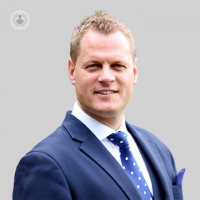How is an arthroscopic meniscectomy performed?
Written in association with:In this article, Mr Simon Thompson, a highly experienced consultant orthopaedic knee surgeon, explains in detail how an arthroscopic meniscectomy is performed, how long it takes, and what recovery from it entails.

How is an arthroscopic meniscectomy performed?
Arthroscopy, also known as keyhole surgery, is designed to be minimally invasive. This surgery involves cutting small incisions around the knee. I use this procedure to perform the majority of soft tissue knee operations, including meniscal repair and removal (meniscectomy), and ACL reconstruction.
How long does it take to perform? What are the challenges of this type of operation?
The procedure is performed as a day-case procedure, and typically takes around 30 minutes. It can be longer or shorter, depending on the complexity. Surgery for the anterior cruciate ligament (ACL) may take slightly longer.
What is the recovery period like following an arthroscopic meniscectomy?
My patients are usually fully mobile and walking straight away. They may need crutches for a short period of time and I advise early utilisation of physiotherapy post-surgery to get the best results. If the meniscus is repairable, either completely or partially, then the rehabilitation process may involve restriction of movement or weight bearing, and sometimes, the wearing of a knee brace.
How soon can patients return to activity?
This is dependent on the activity required, and is determined on a case-by-case basis, as many of my patients are professional or elite athletes. I liaise with the club physio (or your physio) to make sure return to play (RTP) is achieved safely. Physiotherapy should start straight away post operatively, and once the stitches are removed two weeks after the operation, then the physiotherapist can really start working on rehabilitation.
Is any type of follow-up required after an arthroscopic meniscectomy?
There is a follow up at week two, week six, and week 12 after surgery, but this can vary, depending on the complexity of the surgery.
Are there likely to be any lasting effects in the long term?
The long-term outcome is determined really by the initial injury and the damage sustained at the time. I discuss this with the patient so they understand the natural history of their problem and what the role of surgery would be.
If you wish to book an appointment today with Mr Simon Thompson, visit his Top Doctors profile to do just that.


